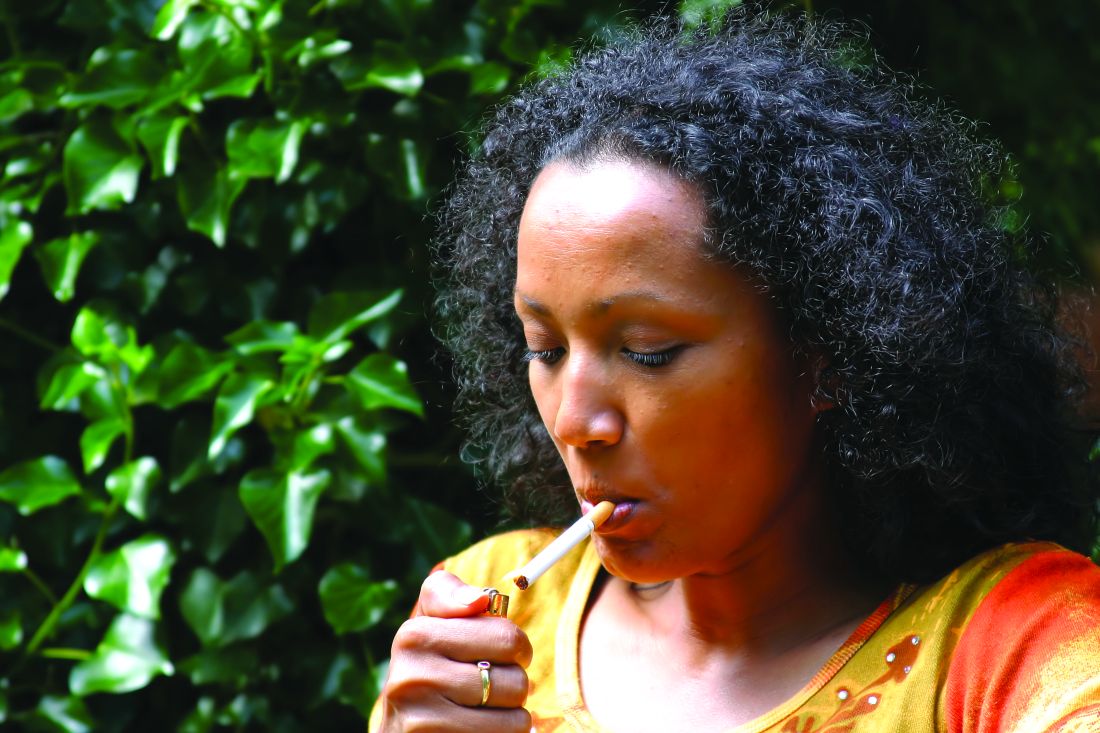User login
Black women who smoke cigarettes are at increased risk of systemic lupus erythematosus (SLE), while those who drink alcohol in moderation have a decreased risk, data from the prospective Black Women’s Health Study suggests.
The current findings among black women, who are the demographic group at the highest risk of SLE in the U.S. population, are consistent with the previously reported positive association of cigarette smoking with risk of SLE and inverse association of alcohol consumption with SLE,” lead researchers Yvette Cozier, DSc, and Medha Barbhaiya, MD, and their colleagues wrote in a study published in Arthritis Care & Research.
“The role of environmental factors in the pathogenesis of SLE is of great interest, as genetic factors do not explain a major portion of the incidence. Cigarette smoking has been associated with SLE risk in several, but not all, past studies,” wrote Dr. Cozier of the Slone Epidemiology Center at Boston University and Dr. Barbhaiya of the Hospital for Special Surgery, New York, and their coauthors.
Their analysis of data from the Black Women’s Health Study, a prospective study following 59,000 black women in the United States since 1995, identified 127 new cases of SLE between 1995 and 2015 that were confirmed by medical records.
At baseline, 8,851 women (16%) were current smokers, and 10,447 (18%) were past smokers. A total of 14,001 (25%) were current drinkers, and 10,255 (18%) were past drinkers.
The researchers reported that, compared with never smokers, women who had ever smoked had a 45% higher risk for SLE than did never smokers (hazard ratio, 1.45; 95% confidence interval, 0.97-2.18), but the finding was not statistically significant.
The risk of SLE was greater among current smokers (52% higher risk) than among past smokers (41% higher risk), and greater for 20 or more pack-years of smoking (60% higher risk) than for less than 20 pack-years of smoking (37% higher risk), although the authors noted that none of these differences were statistically significant.
Current and past alcohol consumption were associated with nonsignificant reductions in risk for SLE, 29% and 21%, respectively. However, “moderate” current alcohol consumption, measured as four or more drinks per week, was associated with a 57% reduction in risk for SLE (HR, 0.43; 95% CI, 0.19-0.96).
The researchers said that the associations between cigarette smoking and alcohol intake with SLE risk were biologically plausible and may lead to insights into SLE pathogenesis. For example, exposure to toxic components from cigarette smoke was associated with increased oxidative stress and stimulation of autoantibody production, and such exposure can directly damage endogenous proteins and DNA. Alcohol suppresses the synthesis of proinflammatory cytokines and may inhibit DNA synthesis.
The small number of lupus cases in the Black Women’s Health Study cohort limited the statistical power of the analysis. Smoking and alcohol use were also relatively uncommon among women in the Black Women’s Health Study cohort, the investigators said.
“Future studies are needed to confirm these findings and establish the biologic mechanisms by which cigarette smoking and alcohol consumption influence the risk of SLE in this population and others,“ they wrote.
The study was supported by individual investigators’ grant awards from the National Cancer Institute, the National Institute of Arthritis and Musculoskeletal and Skin Diseases, the Rheumatology Research Foundation, and the Lupus Foundation of America. The authors declared no relevant conflicts of interest.
SOURCE: Cozier Y et al. Arthritis Care Res. 2018 Aug 9. doi: 10.1002/acr.23703.
Black women who smoke cigarettes are at increased risk of systemic lupus erythematosus (SLE), while those who drink alcohol in moderation have a decreased risk, data from the prospective Black Women’s Health Study suggests.
The current findings among black women, who are the demographic group at the highest risk of SLE in the U.S. population, are consistent with the previously reported positive association of cigarette smoking with risk of SLE and inverse association of alcohol consumption with SLE,” lead researchers Yvette Cozier, DSc, and Medha Barbhaiya, MD, and their colleagues wrote in a study published in Arthritis Care & Research.
“The role of environmental factors in the pathogenesis of SLE is of great interest, as genetic factors do not explain a major portion of the incidence. Cigarette smoking has been associated with SLE risk in several, but not all, past studies,” wrote Dr. Cozier of the Slone Epidemiology Center at Boston University and Dr. Barbhaiya of the Hospital for Special Surgery, New York, and their coauthors.
Their analysis of data from the Black Women’s Health Study, a prospective study following 59,000 black women in the United States since 1995, identified 127 new cases of SLE between 1995 and 2015 that were confirmed by medical records.
At baseline, 8,851 women (16%) were current smokers, and 10,447 (18%) were past smokers. A total of 14,001 (25%) were current drinkers, and 10,255 (18%) were past drinkers.
The researchers reported that, compared with never smokers, women who had ever smoked had a 45% higher risk for SLE than did never smokers (hazard ratio, 1.45; 95% confidence interval, 0.97-2.18), but the finding was not statistically significant.
The risk of SLE was greater among current smokers (52% higher risk) than among past smokers (41% higher risk), and greater for 20 or more pack-years of smoking (60% higher risk) than for less than 20 pack-years of smoking (37% higher risk), although the authors noted that none of these differences were statistically significant.
Current and past alcohol consumption were associated with nonsignificant reductions in risk for SLE, 29% and 21%, respectively. However, “moderate” current alcohol consumption, measured as four or more drinks per week, was associated with a 57% reduction in risk for SLE (HR, 0.43; 95% CI, 0.19-0.96).
The researchers said that the associations between cigarette smoking and alcohol intake with SLE risk were biologically plausible and may lead to insights into SLE pathogenesis. For example, exposure to toxic components from cigarette smoke was associated with increased oxidative stress and stimulation of autoantibody production, and such exposure can directly damage endogenous proteins and DNA. Alcohol suppresses the synthesis of proinflammatory cytokines and may inhibit DNA synthesis.
The small number of lupus cases in the Black Women’s Health Study cohort limited the statistical power of the analysis. Smoking and alcohol use were also relatively uncommon among women in the Black Women’s Health Study cohort, the investigators said.
“Future studies are needed to confirm these findings and establish the biologic mechanisms by which cigarette smoking and alcohol consumption influence the risk of SLE in this population and others,“ they wrote.
The study was supported by individual investigators’ grant awards from the National Cancer Institute, the National Institute of Arthritis and Musculoskeletal and Skin Diseases, the Rheumatology Research Foundation, and the Lupus Foundation of America. The authors declared no relevant conflicts of interest.
SOURCE: Cozier Y et al. Arthritis Care Res. 2018 Aug 9. doi: 10.1002/acr.23703.
Black women who smoke cigarettes are at increased risk of systemic lupus erythematosus (SLE), while those who drink alcohol in moderation have a decreased risk, data from the prospective Black Women’s Health Study suggests.
The current findings among black women, who are the demographic group at the highest risk of SLE in the U.S. population, are consistent with the previously reported positive association of cigarette smoking with risk of SLE and inverse association of alcohol consumption with SLE,” lead researchers Yvette Cozier, DSc, and Medha Barbhaiya, MD, and their colleagues wrote in a study published in Arthritis Care & Research.
“The role of environmental factors in the pathogenesis of SLE is of great interest, as genetic factors do not explain a major portion of the incidence. Cigarette smoking has been associated with SLE risk in several, but not all, past studies,” wrote Dr. Cozier of the Slone Epidemiology Center at Boston University and Dr. Barbhaiya of the Hospital for Special Surgery, New York, and their coauthors.
Their analysis of data from the Black Women’s Health Study, a prospective study following 59,000 black women in the United States since 1995, identified 127 new cases of SLE between 1995 and 2015 that were confirmed by medical records.
At baseline, 8,851 women (16%) were current smokers, and 10,447 (18%) were past smokers. A total of 14,001 (25%) were current drinkers, and 10,255 (18%) were past drinkers.
The researchers reported that, compared with never smokers, women who had ever smoked had a 45% higher risk for SLE than did never smokers (hazard ratio, 1.45; 95% confidence interval, 0.97-2.18), but the finding was not statistically significant.
The risk of SLE was greater among current smokers (52% higher risk) than among past smokers (41% higher risk), and greater for 20 or more pack-years of smoking (60% higher risk) than for less than 20 pack-years of smoking (37% higher risk), although the authors noted that none of these differences were statistically significant.
Current and past alcohol consumption were associated with nonsignificant reductions in risk for SLE, 29% and 21%, respectively. However, “moderate” current alcohol consumption, measured as four or more drinks per week, was associated with a 57% reduction in risk for SLE (HR, 0.43; 95% CI, 0.19-0.96).
The researchers said that the associations between cigarette smoking and alcohol intake with SLE risk were biologically plausible and may lead to insights into SLE pathogenesis. For example, exposure to toxic components from cigarette smoke was associated with increased oxidative stress and stimulation of autoantibody production, and such exposure can directly damage endogenous proteins and DNA. Alcohol suppresses the synthesis of proinflammatory cytokines and may inhibit DNA synthesis.
The small number of lupus cases in the Black Women’s Health Study cohort limited the statistical power of the analysis. Smoking and alcohol use were also relatively uncommon among women in the Black Women’s Health Study cohort, the investigators said.
“Future studies are needed to confirm these findings and establish the biologic mechanisms by which cigarette smoking and alcohol consumption influence the risk of SLE in this population and others,“ they wrote.
The study was supported by individual investigators’ grant awards from the National Cancer Institute, the National Institute of Arthritis and Musculoskeletal and Skin Diseases, the Rheumatology Research Foundation, and the Lupus Foundation of America. The authors declared no relevant conflicts of interest.
SOURCE: Cozier Y et al. Arthritis Care Res. 2018 Aug 9. doi: 10.1002/acr.23703.
FROM ARTHRITIS CARE & RESEARCH
Key clinical point:
Major finding: There was an estimated 45% increase in risk of SLE for ever smoking relative to never smoking, but the finding was of borderline statistical significance. Moderate current alcohol consumption, measured as four or more drinks per week, was associated with a 57% reduction in SLE risk.
Study details: Analysis of data from 59,000 women enrolled in the prospective Black Women’s Health Study between 1995 and 2015.
Disclosures: The study was supported by individual investigators’ grant awards from the National Cancer Institute, the National Institute of Arthritis and Musculoskeletal and Skin Diseases, the Rheumatology Research Foundation, and the Lupus Foundation of America. The authors declared no relevant conflicts of interest.
Source: Cozier Y et al. Arthritis Care Res. 2018 Aug 9. doi: 10.1002/acr.23703.

